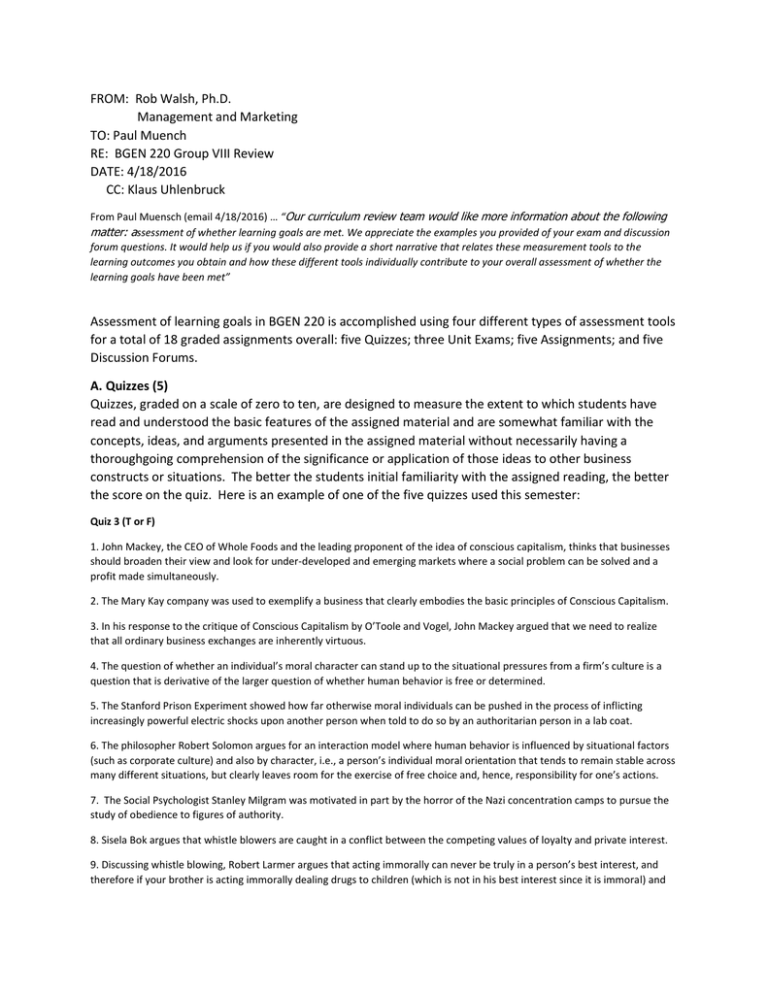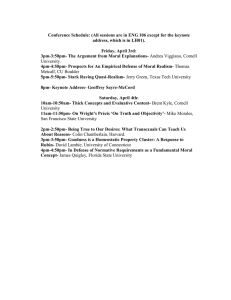FROM: Rob Walsh, Ph.D. Management and Marketing TO: Paul Muench
advertisement

FROM: Rob Walsh, Ph.D. Management and Marketing TO: Paul Muench RE: BGEN 220 Group VIII Review DATE: 4/18/2016 CC: Klaus Uhlenbruck From Paul Muensch (email 4/18/2016) … “Our curriculum review team would like more information about the following matter: assessment of whether learning goals are met. We appreciate the examples you provided of your exam and discussion forum questions. It would help us if you would also provide a short narrative that relates these measurement tools to the learning outcomes you obtain and how these different tools individually contribute to your overall assessment of whether the learning goals have been met” Assessment of learning goals in BGEN 220 is accomplished using four different types of assessment tools for a total of 18 graded assignments overall: five Quizzes; three Unit Exams; five Assignments; and five Discussion Forums. A. Quizzes (5) Quizzes, graded on a scale of zero to ten, are designed to measure the extent to which students have read and understood the basic features of the assigned material and are somewhat familiar with the concepts, ideas, and arguments presented in the assigned material without necessarily having a thoroughgoing comprehension of the significance or application of those ideas to other business constructs or situations. The better the students initial familiarity with the assigned reading, the better the score on the quiz. Here is an example of one of the five quizzes used this semester: Quiz 3 (T or F) 1. John Mackey, the CEO of Whole Foods and the leading proponent of the idea of conscious capitalism, thinks that businesses should broaden their view and look for under-developed and emerging markets where a social problem can be solved and a profit made simultaneously. 2. The Mary Kay company was used to exemplify a business that clearly embodies the basic principles of Conscious Capitalism. 3. In his response to the critique of Conscious Capitalism by O’Toole and Vogel, John Mackey argued that we need to realize that all ordinary business exchanges are inherently virtuous. 4. The question of whether an individual’s moral character can stand up to the situational pressures from a firm’s culture is a question that is derivative of the larger question of whether human behavior is free or determined. 5. The Stanford Prison Experiment showed how far otherwise moral individuals can be pushed in the process of inflicting increasingly powerful electric shocks upon another person when told to do so by an authoritarian person in a lab coat. 6. The philosopher Robert Solomon argues for an interaction model where human behavior is influenced by situational factors (such as corporate culture) and also by character, i.e., a person’s individual moral orientation that tends to remain stable across many different situations, but clearly leaves room for the exercise of free choice and, hence, responsibility for one’s actions. 7. The Social Psychologist Stanley Milgram was motivated in part by the horror of the Nazi concentration camps to pursue the study of obedience to figures of authority. 8. Sisela Bok argues that whistle blowers are caught in a conflict between the competing values of loyalty and private interest. 9. Discussing whistle blowing, Robert Larmer argues that acting immorally can never be truly in a person’s best interest, and therefore if your brother is acting immorally dealing drugs to children (which is not in his best interest since it is immoral) and you fear that if you confront him he will just hide his actions from you and continue dealing, then, according to Larmer it would be your moral duty to blow the whistle to the police on your brother’s illegal behavior. 10. Concerning the issue of advertising to young children, one article we read used a Human Rights approach to argue that children should have the right to exercise free choice about the food they eat because their body is their natural property. B. Exams (3) There are three exams in BGEN 220 corresponding to the three sections of the course structure. Exams are graded on a scale of zero to one hundred. Exams are used to assess a deeper, fuller, and more nuanced comprehension of the assigned material than is anticipated with quiz assessments. On exams, students are expected to be able to “apply the basic concepts and forms of reasoning from the [moral] tradition” with some facility and adroitness. Multiple choice and short and long essay questions are structured in such a way that students must not only understand and be conversant with a rendition of the material in multiple choice questions but also must be able to use strategies of moral reasoning to compare and contrast various ideas or apply moral ideas and concepts to new and different value situations, as illustrated here with the application of whistle blowing standards and the torture scenario. Exam 2 (sample from 17 questions) 1. According to John Mackey, conscious capitalism means a. Businesses should be conscious of corporate social responsibility b. Businesses should be conscious of treating all stakeholders equally c. Businesses should strive to achieve a higher purpose than profit d. Business should strive for creating shared value 2. The question of whether individual moral character can stand firm in the face of the situational pressures of the workplace is connected to the larger question of a. the cognitive moral 'feedback loop' b. Workplace privacy c. freedom and determinism d. consequentialism versus deontology 3. What is the difference between "internal" and "external" whistle blowing? When would a person be justified engaging in external whistle blowing without first engaging in internal whistle blowing? 4. A home-grown terrorist who has threatened to explode several bombs in crowded areas has been apprehended. Unfortunately, he has already planted the bombs and they are scheduled to go off in a short time. It is possible that hundreds, perhaps thousands of people may die and many more will be maimed and injured. The authorities cannot make him divulge the location of the bombs by conventional methods. He refuses to say anything and requests a lawyer to protect his Fifth Amendment right against self-incrimination since he is a citizen. In exasperation, some high level official suggests the use of torture. This would be illegal, of course, but the official thinks that it is nevertheless the right thing to do in this desperate situation. Do you agree or disagree? Why? If you agree, would it also be morally justifiable to torture the terrorist’s innocent wife if that is the only way to make him talk? Don't forget to give the reasons for your judgment and the specific moral principles you would use. 5. Some psychologists believe that inundating young children with advertisements repeatedly and from many directions through various devices a. Can teach how the economy works b. Can cause a loss of touch with reality c. Can cause consumerism and materialism d. Can increase relaxation and focus C. Discussion Forums (5) Discussion Forums are graded on a scale of zero to fifteen. Research demonstrates that didactic ethics courses like BGEN 220, having a combined focus on philosophical methods and the discussion of moral dilemmas and scenarios in the context of a concern for personal development, are especially effective in fostering the growth of principled moral reasoning. In keeping with this research, Discussion Forums in BGEN 220 present students with pro and con articles regarding specific moral issues taken from current events that focus on opposing sides of the value conflict. Students must analyze and evaluate these issues using the conceptual schemes, moral theories and principles which we have studied in class to make an informed moral judgment about the issue. Students must justify their decision using a moral conceptual framework learned in the course. Students are evaluated on how well they are able to frame the moral issue clearly, analyze and evaluate both sides of the issue, and justify their moral judgment regarding the issue through the application of moral theories, principles or value frameworks learned in the course in accordance with the four general requirements for Discussion Forum posts: “Your post should answer these questions: 1. What is the moral issue? 2. What are the arguments on both sides? Summarize and evaluate the arguments of each author. 3. What is your judgment about the issue? 4. Give your reasons and your evidence in support your judgment?” I have previously submitted samples of Discussion Forum topics that I use in this course. D. Written Assignments (5) The five writing assignments in this course, graded on a scale of zero to ten, each call for an evaluation of a fictitious situation in which a person is caught in the horns of a moral dilemma and must make a choice. Students are graded on how well they are able to ‘get a feel’ for the subjective ‘human’ dimensions of the moral situation and balance these against objective, rational considerations; how well they are able to recognize and articulate the moral issue that is at stake in the scenario and how coherently they are able to justify their moral judgment using moral theories, principles, and value frameworks. The difference between Writing Assignments and Discussion Forums is that assignments are fictitious scenario descriptions often directly engaging non-rational emotional elements like the importance of friendship, the fear of losing a job, the need for empathy, etc., whereas Forum issues involve a fairly straightforward cognitive challenge of evaluating moral position arguments in respect to the various moral theories, principles, and value frameworks we have studied.







